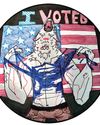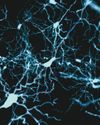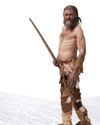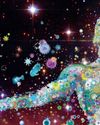Marla Geha works at Yale University in New Haven, Connecticut.

In addition to teaching astronomy, Geha studies the formation, evolution, and destruction of dwarf galaxies. Dwarf galaxies are the most abundant type of galaxy in the universe, but they’re difficult to detect because they’re not very bright and are—as the name suggests— small in size. Maybe you wouldn’t think someone needs to use the world’s largest telescopes to study the universe’s smallest galaxies, but that’s exactly what she does.
WHAT GOT YOU INTERESTED IN ASTRONOMY?
I liked math and physics when I was in school, but I also wanted to travel. Since I am an astronomer, I get to do both. Many of the telescopes I use to do research are located atop mountains in truly beautiful and remote places, such as Chile and Hawaii.
SOUNDS EXOTIC AND FUN. WHAT OTHER INVENTIONS, BESIDES TELESCOPES, HAVE HELPED ASTRONOMERS LIKE YOU MAKE ADVANCES IN THIS FIELD?
By far the most important invention in my field, besides telescopes, has been camera phones. We astronomers use the same technology that is in personal camera phones to take pictures of planets, stars, and galaxies. Taking digital images of the sky has completely changed the questions we ask about the universe.
This story is from the July/August 2017 edition of Muse Science Magazine for Kids.
Start your 7-day Magzter GOLD free trial to access thousands of curated premium stories, and 9,000+ magazines and newspapers.
Already a subscriber ? Sign In
This story is from the July/August 2017 edition of Muse Science Magazine for Kids.
Start your 7-day Magzter GOLD free trial to access thousands of curated premium stories, and 9,000+ magazines and newspapers.
Already a subscriber? Sign In

A 12-Year-Old Girl's Election Sticker Is a Winner
VOTING IS A FUNDAMENTAL FREEDOM FOR AMERICANS, A MEANS OF DOING ONE'S CIVIC DUTY AND A WAY AN INDIVIDUAL CAN EXPRESS THEIR VOICE. In 1971, the United States lowered its voting age to 18. But that doesn't mean kids and teens under 18 can't participate in elections in various ways.

If everything the human brain does is basically sets of electrical impulses, how exactly does that translate into a state of mind?
You're not the only one asking this question. Every neuroscientist in the world is wondering the exact same thing, says Zach Mainen

EARTH'S TINIEST BUILDERS
THE HIDDEN WORLD OF MICROBES IN THE EARTH'S CRUST

MUMMIES SPEAK
ABOUT MICROBES, MIGRATION, AND MORE

GOING WITH YOUR GUT
HOW DO MICROBES AFFECT OUR HEALTH? LET'S COUNT THE WAYS...

BUG Detective
A burglar sneaks into a house on a quiet street in New York City. He walks through the house, touching countertops and door handles. Finally, he steals a single card from a full deck. Then he leaves.

Little Creatures Among Us THE MANY MICROBES IN OUR DAILY LIVES
When you think you're alone, you're actually not. In the ground, the air, your room, and even your body are Strillions and trillions of creatures so tiny you can't see them.

A Mars Rock Found With Leopard Spots Could Be a Sign of Ancient Life
IN JULY, NASA'S PERSEVERANCE ROVER CAME ACROSS A SPOTTED ROCK IN WHAT WAS ONCE A RIVERBED IN THE JEZERO CRATER ON MARS.

Para Athlete Uses Exoskeleton Suit to Carry the Olympic Torch
In July, a 36-year-old French tennis para athlete, Kevin Piette, got a chance to participate in this summer’s Olympic torch relay without using a wheelchair.

Ancient Egyptians May Have Used a Water System to Lift Stones to Build Pyramid
HOW ANCIENT EGYPTIANS BUILT THE MASSIVE PYRAMIDS IN EGYPT MORE THAN 4,000 YEARS AGO HAS LONG BEEN A TOPIC OF WONDER AND DEBATE.